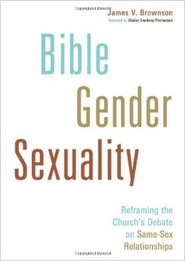Jamie Smith raises some good questions on his blog today, in particular about whether the traditional Christian view of marriage and sexuality should be called "orthodox" and its opponents labeled "heretics." It sounds like he's been reading someone who repeatedly connects "orthodox Christianity" with viewing marriage as between a man and woman. Smith notes that, historically, what is considered "orthodox" grows out of ecumenical councils and creeds, which attempted to clarify Scripture's teaching in the face of key questions about disputed matters of the day, such as the divinity of Jesus. Given that teaching on marriage and sex don't figure prominently in these ecumenical councils, he raises the question: is it really fair to call marriage between a man and woman the "orthodox" view? Isn't it more accurate to call it the "traditional" view?
I think the linguistic and theological observations and questions he raises are worth considering. But I'd propose that, rather than use the word "traditional" to describe marriage between a man and woman, it would be better to use the word "catholic," in the sense of "universal." Now, I know that there are some who would protest the use of the word "catholic" to describe the view that marriage is between a man and woman, pointing to the many Christians who now support same-sex marriage.
But here's why I think it's a better approach. For starters, most "orthodox" beliefs had to undergo the historical transition from "catholic" to "orthodox" beliefs. For example, the divinity of Jesus is affirmed in Scripture and practiced in the worship of the early church, from the New Testament on. But on Smith's terms, this belief wasn't "orthodox" until the Christological controversies of the 3rd and 4th centuries led to lengthy debates and creeds like that of Nicea and Constantinople. In other words, a "catholic" belief has to be challenged for it to take on the status of "orthodoxy."
This can help us think about our own historical moment and how we should talk about orthodoxy in relation to marriage and sexuality. Is it fair for someone to claim that Christians can hold any position on marriage, including affirming same-sex marriage, since there is no "orthodox" position on marriage? No (and Smith rightly points this out). Why? Because the creeds and confessions of the church were never meant to be exhaustive, stating everything or even everything essential that Christians should believe or practice. For that, we have Scripture, the only rule of faith and life for Christians.
But I do think what is happening now in North American culture is that our questions and controversies about marriage are causing it to move from a "catholic" issue to an "orthodox" issue. That is, there is no longer universal (catholic) agreement on marriage. This means that churches and denominations have to decide: how does Scripture speak to this and what must Christians say and do to be faithful to Scripture? We can't just rely on the fact that "it's always been this way," but we have to go to Scripture to articulate clearly why we believe and practice what we believe and practice.
Orthodoxy is what is produced as the church returns to Scripture by the power of the Spirit in the light of each age's challenges. All of this highlights the fact that "orthodoxy" is not merely a once-for-all set of tenets passed down from ages immemorial but a posture of engagement as we consider the questions and challenges of our day.
I think the linguistic and theological observations and questions he raises are worth considering. But I'd propose that, rather than use the word "traditional" to describe marriage between a man and woman, it would be better to use the word "catholic," in the sense of "universal." Now, I know that there are some who would protest the use of the word "catholic" to describe the view that marriage is between a man and woman, pointing to the many Christians who now support same-sex marriage.
But here's why I think it's a better approach. For starters, most "orthodox" beliefs had to undergo the historical transition from "catholic" to "orthodox" beliefs. For example, the divinity of Jesus is affirmed in Scripture and practiced in the worship of the early church, from the New Testament on. But on Smith's terms, this belief wasn't "orthodox" until the Christological controversies of the 3rd and 4th centuries led to lengthy debates and creeds like that of Nicea and Constantinople. In other words, a "catholic" belief has to be challenged for it to take on the status of "orthodoxy."
This can help us think about our own historical moment and how we should talk about orthodoxy in relation to marriage and sexuality. Is it fair for someone to claim that Christians can hold any position on marriage, including affirming same-sex marriage, since there is no "orthodox" position on marriage? No (and Smith rightly points this out). Why? Because the creeds and confessions of the church were never meant to be exhaustive, stating everything or even everything essential that Christians should believe or practice. For that, we have Scripture, the only rule of faith and life for Christians.
But I do think what is happening now in North American culture is that our questions and controversies about marriage are causing it to move from a "catholic" issue to an "orthodox" issue. That is, there is no longer universal (catholic) agreement on marriage. This means that churches and denominations have to decide: how does Scripture speak to this and what must Christians say and do to be faithful to Scripture? We can't just rely on the fact that "it's always been this way," but we have to go to Scripture to articulate clearly why we believe and practice what we believe and practice.
Orthodoxy is what is produced as the church returns to Scripture by the power of the Spirit in the light of each age's challenges. All of this highlights the fact that "orthodoxy" is not merely a once-for-all set of tenets passed down from ages immemorial but a posture of engagement as we consider the questions and challenges of our day.





 RSS Feed
RSS Feed